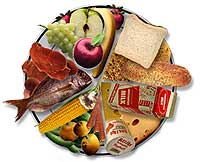Drinking & Eating Safely

One of the pleasures of travel is enjoying the local cuisine. On the other hand, travellers diarrhoea, Giardia, Salmonella, Shigella, Campylobacter, Cryptosporidium, Hepatitis A, Hepatitis E, typhoid fever, cholera...all these infections and more can come from consuming contaminated food and drink.
The first important preventative measure is to be meticulous with your own personal hygiene when travelling in less developed countries. Bacteria can be carried to the mouth on hands and cutlery, always wash your hands before eating and avoid putting fingers and thumbs anywhere near your mouth.
The second important measure is to be selective in what you eat and drink. You cannot avoid risk altogether, but you can at least avoid the obvious sources of trouble. Here are some general 'do's and don'ts'.
DRINKING
Do Drink:
Boiled water is safe. You do not need to boil it for minutes as was once said. Just bringing it to the boil will kill most organisms.
Bottled water is usually safe but do check that the seal is unbroken, as refills from the tap are not unknown!
Purified Water - modern water purifiers such as the Pur Voyageur are transportable and very effective. Used correctly, they will eliminate any organic material and organisms from water and render it about as safe as you can possibly get.
Chemically disinfected water - the simplest way to do this is to use iodine-based tablets (drinking water tablets), which are added to water before drinking. The instructions must be followed correctly. You cannot rely on these to work if the water is cloudy or contaminated with organic material such as leafy matter. Only a water purifier could render such water drinkable.
Cans of soft drink, especially international brands, are low risk. Local beer is similar in risk.
Wine and spirits are usually imported and safe but do not order your whisky 'on the rocks', as ice is to be avoided. (And no, the alcohol will not kill the germs in the ice!)
Do Not Drink
Any other water. Presume all other sources of water are contaminated. This includes brushing the teeth. Use bottled water for this.
Ice. Freezing preserves germs; it does not kill them.
EATING
Do not eat:
Uncooked, undercooked food or reheated food
Salads or unpeelable fruit and vegetables
Ice cream (unless it is an internationally packaged and labelled brand) and dairy products
Oysters, clams, mussels, barbecued prawns or mud crabs
Food that has been left around exposed to flies
Dishes requiring a lot of food handling to prepare.
Do eat:
Freshly cooked (fried, boiled, steamed) food
Peelable fruits -bananas, citrus fruits, etc
Food of acceptable brands in cans or sealed packs
In well patronised, busy restaurants serving local food
Off clean plates with clean cutlery (consider taking your own cutlery)
Food prepared by you.
This article with thanks to http://www.traveldoctor.com.au
The first important preventative measure is to be meticulous with your own personal hygiene when travelling in less developed countries. Bacteria can be carried to the mouth on hands and cutlery, always wash your hands before eating and avoid putting fingers and thumbs anywhere near your mouth.
The second important measure is to be selective in what you eat and drink. You cannot avoid risk altogether, but you can at least avoid the obvious sources of trouble. Here are some general 'do's and don'ts'.
DRINKING
Do Drink:
Do Not Drink
EATING
Do not eat:
Do eat:
This article with thanks to http://www.traveldoctor.com.au
MORE



